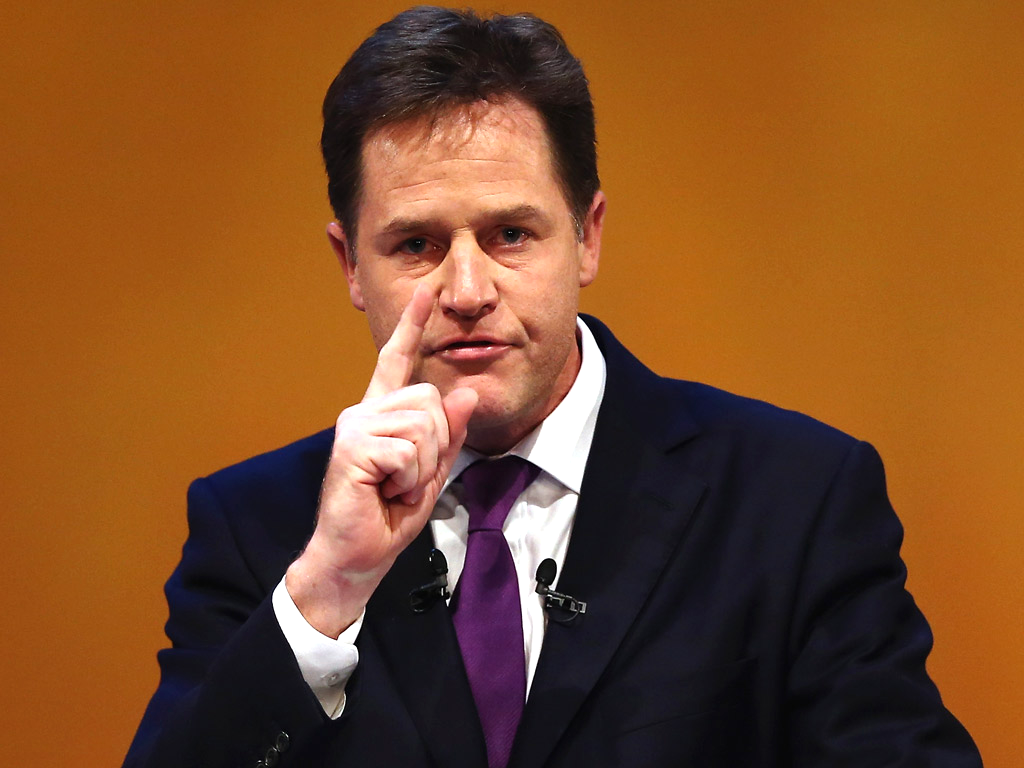Exclusive: Nick Clegg' plans to raise personal tax allowance 'will help better-off more than low-paid'
IPPR study also called into question his claim that raising allowance to £10,500 would mean a tax cut of £100 a year

Nick Clegg's plan to raise the personal tax allowance will help better off people more than the low paid, according to a new study.
The Liberal Democrats, who have persuaded the Conservatives to raise the income tax threshold to £10,000 a year from next April, have proposed a further rise to £10,500 in April 2015. Mr Clegg's party will fight the election the following month on a pledge to increase the allowance to £12,500 a year during the next parliament.
The Lib Dems have contrasted their flagship plan to help "ordinary workers" with the Tories' decision to cut in the top tax rate from 50p to 45p. But analysis by the Institute of Public Policy Research (IPPR) think tank shows that under Mr Clegg's plans, people in the seventh, eighth and ninth of the 10 deciles on the earnings ladder would see a bigger percentage rise in their income than those lower down the scale.
The IPPR study also called into question the claims made by the Deputy Prime Minister last weekend. He said that raising the personal allowance to £10,500 would mean a tax cut of £100 a year. The IPPR put the figure at £54. Mr Clegg put the cost at £1bn, but the think tank said the move would cost £1.28bn. It also warned that raising the allowance so that no one on the minimum wage would pay income tax (currently £12,500) could cost up to £20bn.
Nick Pearce, the director of the IPPR, told The Independent: "Raising the personal tax allowance costs a lot of money and most of the benefit goes to better off households, not the low paid. It is doubly hard to justify when public services are being sharply cut to pay down the deficit. Raising it to £12,500 in the next parliament will pile even more pressure onto the NHS, care of the elderly and other vital services."
Another think tank, the Resolution Foundation, has calculated that a £12,500 threshold would give no help to the 5m lowest paid workers, all of whom will earn less than £10,000 by 2015. It found that more than 60 per cent of people earning the minimum wage would not benefit because they work part-time.
Gavin Kelly, the foundation's chief executive, said: "Those who argue for the policy need to be honest that further increases do nothing for Britain's 5m lowest paid workers, overwhelmingly part-time and female, who by 2015 will already earn too little to pay tax. If tax cuts are the choice politicians have made, it's still hard to see how further cuts in income tax can be a priority over raising the national insurance threshold which, even now, hits workers after they earn just £8,000 a year."
He added: "Any politician thinking about tax cuts in the next parliament needs to first address the impending collision between tax cuts and universal credit. Unless this is fixed, many low to middle income households-particularly those with children-will lose most of the promised gains."
A senior Lib Dem source replied: "This is an income tax cut. By definition, it is aimed at people who are in work and is designed to both make work pay and be part of the Lib Dem ambition to shift the burden of taxation in Britain away from work onto wealth. Some of the lowest paid - anyone earning between £6,475 and £10,000 a year - will not benefit from this policy because they are one of the 2.7m people who have been lifted out of paying income tax altogether by the Lib Dems' policy of increasing the personal allowance."
He added: "Most people would certainly not regard a family with two parents earning just over £12,500 each as rich but they will benefit from this policy. As will every single basic rate taxpayer rate in the country. Some 24m people will benefit from this flagship Lib Dem policy. They are people who have worked hard through over three years of austerity and we believe they deserve a workers' bonus of further £100 of their tax bill - to add to the £700 we have already put back in their pockets."
Join our commenting forum
Join thought-provoking conversations, follow other Independent readers and see their replies
Comments
Bookmark popover
Removed from bookmarks